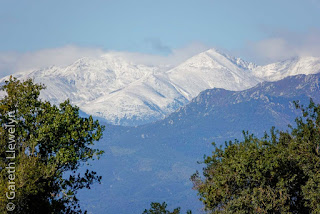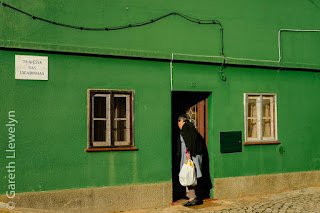Ibuprofen, paracetamol and a 141/2% local Murcia red was a requirement after our recent hike to see a dinosaur footprint. It was worth seeing, too! That, along with so much of Spain’s geography, brings home the age of the Earth and the momentary status of human history in comparison. It makes flippin Brexit look like a pointless waste of our time for sure!
We are in Sierra Espûna, Murcia. This is a Nature Park and the site we’ve settled in for the week at El Berro is at an altitude of 630 metres. The magnificent peak in the middle of the park is nearly 1600 metres with vertical sides! The park is the creation of Ricardo Cordoniu, a 19th century philanthropist who, returning to his home region after living in Madrid, was horrified at how denuded of trees it had become, so he set about planting new forest around the mountain, Espuña. The park is certainly lovely. It is a haven for wildlife and a playground for hikers, mountain bikers and hang-gliders. Getting here, though, motor-homers have to take a deep breath and suffer a rattle of a ride on the road up to the village and the campsite. Also it is colder here than down at the coast.
It was even colder in the volcano park in Catalûna that we ventured up into. This is the second time we’ve been drawn to the mountains even though we came seeking sunshine and warmth. Hymer must be wondering, too, why we keep dragging her to these places. Poor thing. She had to go to the Fiat hospital in Figueres for a new wheel bearing and as soon as she was fixed we took her off up into the mountains, to the volcano park. The cheese seller in a little market in pretty Besalú had said we should visit Rupit, and the long, windy drive up from Olot rewarded us with glorious autumn red deciduous woodland; the forest floors a vibrant red, crispy carpet. Simply stunning!
Rupit, again a town at altitude (and therefore cold - yes, we had frost and snow up there), was fascinating. It’s a tourist draw, for sure, being built into and onto the jagged rock. The rock strata made natural stepped streets in and around the medieval buildings. A wooden suspension footbridge takes you from the car park across the river into the village (I am such a wimp on those things, and the dogs were quite unsettled by it, too). Cosy restaurants glowed from within the thick dark stone window reveals and the bakery there had my mouth watering with all of the local delicacies on offer.
 |
Rupit |
Our experience of places in Catalûna left us with the impression that it is a prosperous region. No wonder the Spanish government is so determined to hang on to it. In the northern quarter of that region, the Independence movement is evidently strong, as is the anger over imprisonment of their democratically elected leaders. We narrowly missed getting caught up in a many miles long traffic queue where protesters stopped traffic on the main route between Catalûna and France for 30 hours! Another Brit we spoke to had been held up for 8 hours on his way in from France.
 |
| Besalú |
Much as I would have liked to visit Barcelona, we gave it a miss and like the other snow-birds we picked up the trail south in search of Vitamin D. Murcia, here, doesn’t seem to be as well off, though Valencia and the coast seems affluent enough and is well populated with Brits and other Northern Europeans, too, of course.
Drawn to Denia and Xabia because of a lovely week I’d spent with my dear departed aunt when she rented an apartment there one winter, we got Hymer into a sticky predicament and Gareth into a bit of a mood with me for once again finding challenging places to navigate with a motorhome. As a passenger, though, I could enjoy the spectacular views.......stifling the instinct to share them with him, my mouth firmly shut to contain the “oooo”s and “oh, look at that!”s of course.
Benidorm and Alicante were spectacular views in terms only of their skyscraper madness. The coast line is beautiful enough, if you don’t look at the massive concretisation along it. It made what we saw last year of Malaga and the Costa del Sol look positively restrained. Gareth did point out, though, that the craggy-ness of the man-made landscape somehow reflected the craggy-ness of the natural landscape where the looming massifs rise dramatically out of the plains.
We had a stop-over in a very nice paid-for private aire (Area 7) in St Joan Alicant overshadowed by what seemed to be mostly vacant skyscraper blocks before heading for where we are now. And here in El Berro, we have found the kind of r&r that soothes the soul, clears the head and opens the mind to new ways of being. There are periods of perfect silence here that are like a salve to the itchy brain. The air is perfumed from the herbs growing naturally everywhere, and for the time being we have made this our retreat. Our souls are catching up with us, Hymer is also having a break and the dogs are loving the walks. I now understand the claim this place makes that “Once here you won’t want to leave”.
(More pictures to follow)
(More pictures to follow)



































